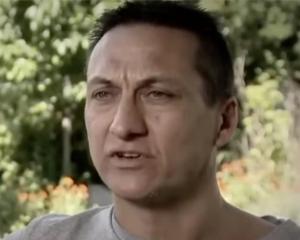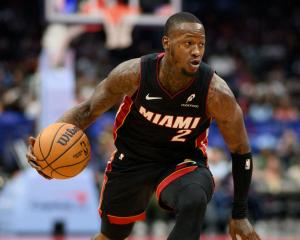Just moments later, 28-year-old Darren Wilson would fatally shoot Michael Brown, 18, in an incident that has sharply divided the country amid conflicting accounts of what happened in the middle of a street in Ferguson, Missouri, on Aug. 9.
Newly released documents detail his crucial testimony to a grand jury that eventually declined to indict him, revealing what happened from his perspective.
Wilson, who is about 6 feet 4 inches tall (1.95 metres) and weighs 210 pounds (95 kg), said he struggled with Brown, who was similarly tall and 289 pounds (130 kg), from inside his police car.
"I felt like a 5-year-old holding on to Hulk Hogan," he said.
Brown's family and supporters have maintained a different version of events, saying the unarmed teenaged was the victim of an officer who aggressively confronted their son and then shot him while his hands were raised in a sign of surrender.
Events began to unfold, Wilson told the grand jury, when he stopped Brown about halfway into a 12-hour shift, which began at 6:30 a.m., and observed he was holding cigarillos that had just been reported stolen from a nearby store.
The first thing he noticed about Brown was how big he was, walking in the middle of a road with a smaller friend, Dorian Johnson.
Wilson, who has been on paid administrative leave since the shootings, did not learn their names until the next day, according to testimony, in which he described the neighborhood as being "antipolice" and acknowledged being on high alert.
Initially, he said, he tried to talk to Brown from inside his police vehicle, but the teen cursed at Wilson and then lunged at him.
Brown landed two punches to his face, Wilson testified, adding that he feared a third could have been deadly.
With no taser in his car, Wilson considered using mace or a flashlight in defense, but the five-year police veteran said he felt neither would be effective.
'GET BACK'
He drew his gun, which Brown had grabbed and twisted until it dug into Wilson's hip, Wilson testified.
"I said: 'Get back or I'm going to shoot you,'" Wilson recalled saying.
"He immediately grabs my gun and says: 'You are too much of a pussy to shoot me''"
Wilson said he fired a shot from inside the vehicle, shattering the window. It was the first time he had fired his weapon at someone on duty, he said.
According to Wilson's testimony, Brown stepped back, then lunged again. Wilson fired again and Brown began to run. Wilson exited the car and chased him.
Across the street, Brown stopped and turned to face Wilson.
Wilson said he told Brown to get on the ground. Brown did not. Backing up rapidly, Wilson fired multiple rounds of shots.
"I know if he reaches me, he kills me," Wilson testified.
Wilson said he did not know how many bullets struck Brown, who was shot six or seven times.
Brown fell face forward, and Wilson said he knew he was dead.
Later, when police backup arrived at the shooting scene, a sergeant asked Wilson what had happened. "I said, I had to kill him," according to his testimony.
TWO SIDES OF TRAGEDY
Wilson could have faced charges ranging from involuntary manslaughter to first-degree murder and Brown's family said through their lawyers that they were "profoundly disappointed" by the grand jury's finding.
"They want the police to be held accountable, to treat us like Americans, too, so we can get equal justice," Brown family attorney Benjamin Crump said on CNN. "This system always allows police to hurt and kill our children. We've got to change that dynamic."
Brown's family planned to speak to reporters at 11 a.m. CST (1700 GMT), Crump said.
Attorneys for Wilson, who was placed on administrative leave and has avoided the spotlight since the shooting, said he was following his training and the law when he shot Brown.
"We recognize that many people will want to second-guess the grand jury's decision," their statement said. "We would encourage anyone who wants to express an opinion do so in a respectful and peaceful manner."
Wilson told the grand jury that Brown had tried to grab his gun and he felt his life was in danger when he fired, according to documents released by prosecutors.
"I said, 'Get back or I'm going to shoot you,'" Wilson said, according to the documents. "He immediately grabs my gun and says, 'You are too much of a pussy to shoot me.'"
SEPARATE PROBE CONTINUES
The grand jury of nine whites and three blacks began meeting in late August and heard testimony from 60 witnesses called by the prosecution, including medical examiners who performed three autopsies, one by a private pathologist hired by Brown's family.
St. Louis County Prosecutor Bob McCulloch declined to say if the jury's decision was unanimous. At least nine jurors would have needed to agree on indictment.
A separate federal investigation into the shooting continues and U.S. Attorney General Eric Holder emphasized the Justice Department investigators had not reached any conclusions.
McCulloch described a tangled mass of conflicting testimony about what happened in the shooting but said much of it did not square with physical evidence.
Lawyers for Brown's family say he was trying to surrender when he was shot while Wilson's supporters say the officer feared for his life and fired in self-defense.
Witnesses disagreed on whether Brown's hands were up at the time he was shot, McCulloch said, adding that Wilson shot at Brown 12 times. The final shot hit the top of his head.












